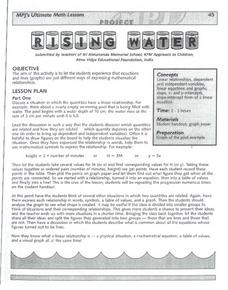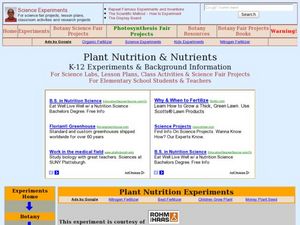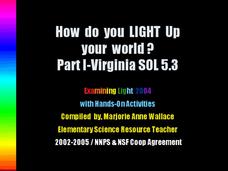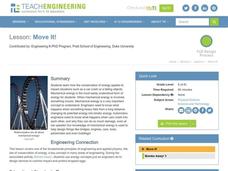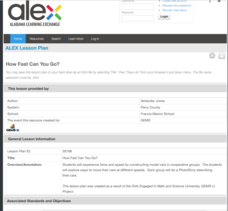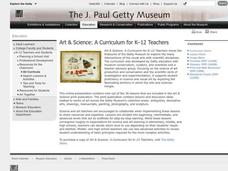Curated OER
Get to know H2O!
Students investigate scientific concepts and inquire about physical states of matter. The transition of water is considered and is easy to facilitate because of its abundance and often observed physical changes.
Forest Foundation
Fire Investigation and Experimentation
Assess the probability of a wildfire with several lessons about fire danger ratings and risk factors. After experimenting with fuel moisture, learners explore the various elements that could contribute to a wildfire, such as wind speed,...
Curated OER
What Are Physical Changes in Matter?
In this matter worksheet, students write down 3 causes and effects of physical changes in matter. This worksheet is a graphic organizer.
Curated OER
Rising Water!
Students observe water change from a liquid to a gas state when heated and then return to its liquid stage when cooled. They learn that gas molecules move faster than liquid molecules. They discover physical properties that describe how...
Curated OER
Plant Nutrition and Nutrients
Students observe seeds growth and examine the different parts of the seedling. In this biology lesson, students compare the growth of seeds planted in soil and in hydroponics. They record their observations in their science journal and...
Curated OER
Rocks and Minerals
Students are able to describe earth processes (e.g., rusting, weathering, erosion) that have affected selected physical features in students, neighborhoods. They are able to identify various earth structures (e.g., mountains, faults,...
Curated OER
Get into the Flow with an Interactive Volcano
Students research the structural elements of a volcano. They make a PowerPoint slide that contains five facts which will be added to a whole class slideshow. They add an interactive table of contents using action buttons.
Curated OER
What is Physical Change?
In this physical change worksheet, students will brainstorm types of physical change and will write down the cause and effect of each example in this graphic organizer.
Curated OER
How Do You Light Up Your World?
A fabulous presentation on light is here for you. In it, learners view slides which cover many important concepts of light. They understand exactly what light is, what the main sources of light are, what opaque, transparent, and...
Curated OER
How Do You Light Up Your World?
A tremendous presentation on the properties of light. Young scientists are treated to slides which share a lot of fascinating information about light. This impressive PowerPoint is filled with great photos, graphics, and discussion...
K12 Reader
Hide and Seek
Why do certain animals look the way they do? It could be because they have developed camouflage. Kids can read up on camouflage and mimicry and then respond to five questions related to the content of the passage.
Cornell University
Catapults
Ready, aim, fire! Launch to a new level of understanding as scholars build and test their own catapults. Learners explore lever design and how adjusting the fulcrum changes the outcome.
Cornell University
Catapult
Studying levers couldn't be more exciting! Learners build their own catapults and test the results as they make adjustments to the fulcrum. They compete against other groups to create the most accurate apparatus.
Cornell University
Unknown Powders
Create a little scientific magic within your classroom! Learners mix powders and liquids and identify chemical reactions. Based on the reactions, individuals determine the identity of various powders.
Institute of Electrical and Electronics Engineers
Be a Scanning Probe Microscope
Extensive reading is done in order to learn about scanning probe microscopy and nanoscale. Afterward, individuals use a pencil to probe an unidentified object that is inside of a box so that they cannot see it. Using only what they could...
Curated OER
Pet Rocks
Students complete a variety of activities related to the physical characteristics of minerals. They classify and group candy, classify rocks and complete a Pet River Rock worksheet. Students try to guess which rock goes with each...
Curated OER
Move It!
Learners observe a demonstration presented by the teacher covering different types of energy. They participate in an experiment where they study numerous physics vocabulary words and visit websites that demonstrate examples of these...
Alabama Learning Exchange
How Fast Can You Go?
Learners investigate force and speed. In this physics lesson, students construct model cars in small groups and perform experiments to identify what factors influence speed and force.
Curated OER
Characteristics of Matter
Students study matter. In this science lesson plan, students examine the relationships among gravity, weight, and mass, the metric measurement of distance and volume, and density and its application to physical properties.
Curated OER
The Chemistry of Ceramics
Students compare the characteristics of a fired porcelain sculpture to the clay used to create it. They discuss the physical and chemical changes that occur in the clay as it is heated and then create their own clay sculpture. This...
Curated OER
Alternative Energy
Students discover types of energy. In this physics lesson plan, students discuss ways to power a car a design a model car kit with an alternative form of energy.
Curated OER
The Science of Swinging
Students learn how a pendulum works in the concept of an amusement park ride. In this pendulum lesson, students are introduced to Newton's first law of motion and how it works in an amusement park ride. Continuous motion and inertia are...
Curated OER
Science Inquiry Lesson: Mapping Project
Students explore the methods of creating maps. They create a map of Animas River Park using a compass and measuring tape, develop a single map from the team map sections, and devise another map of the Animas River Park using a GPS unit.
Curated OER
Circle of Pong
Students, in groups, use given materials to devise a way to deposit a ping-pong ball into a paper cup that is located in the middle of a 6-foot diameter circle, while standing outside the circle.





